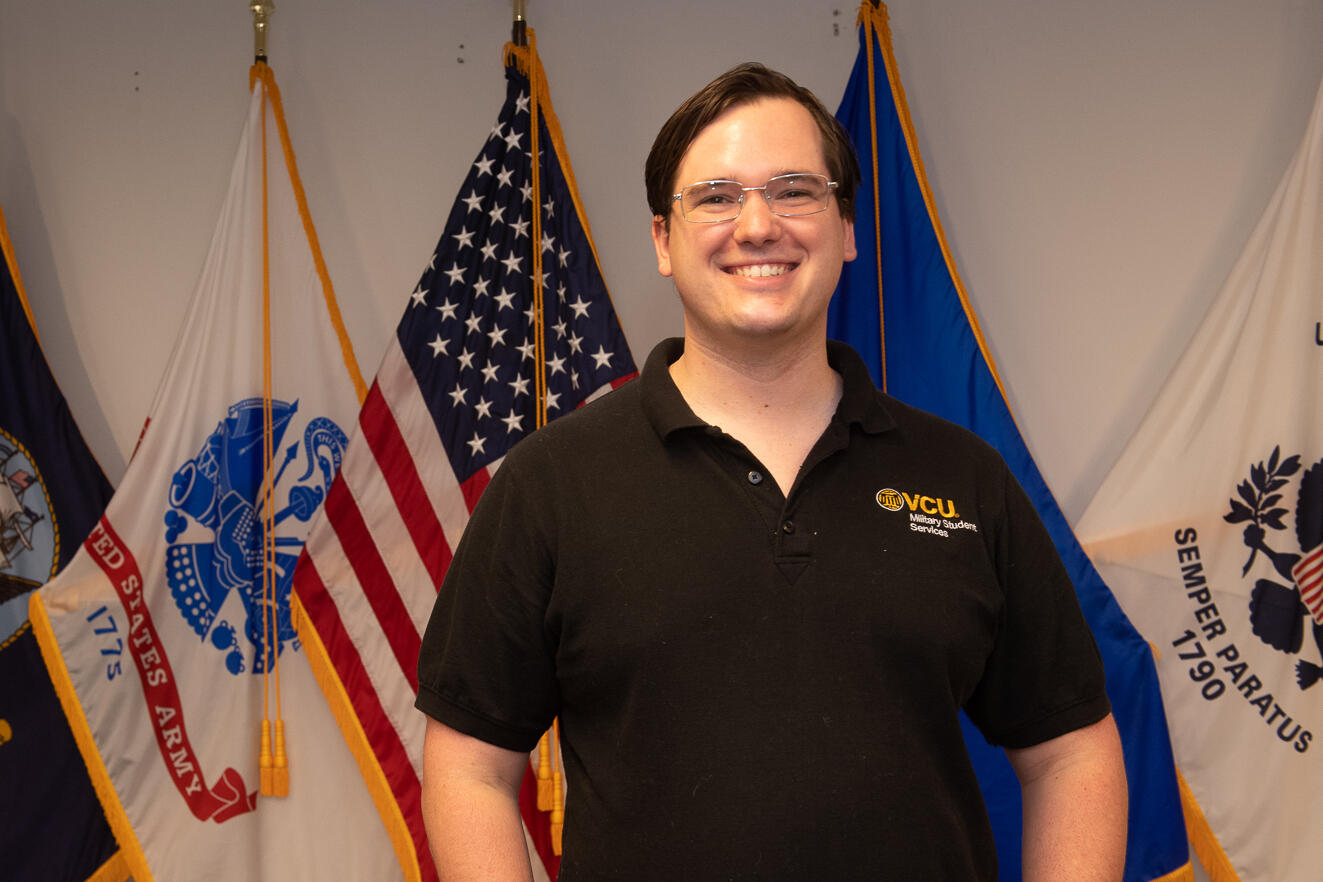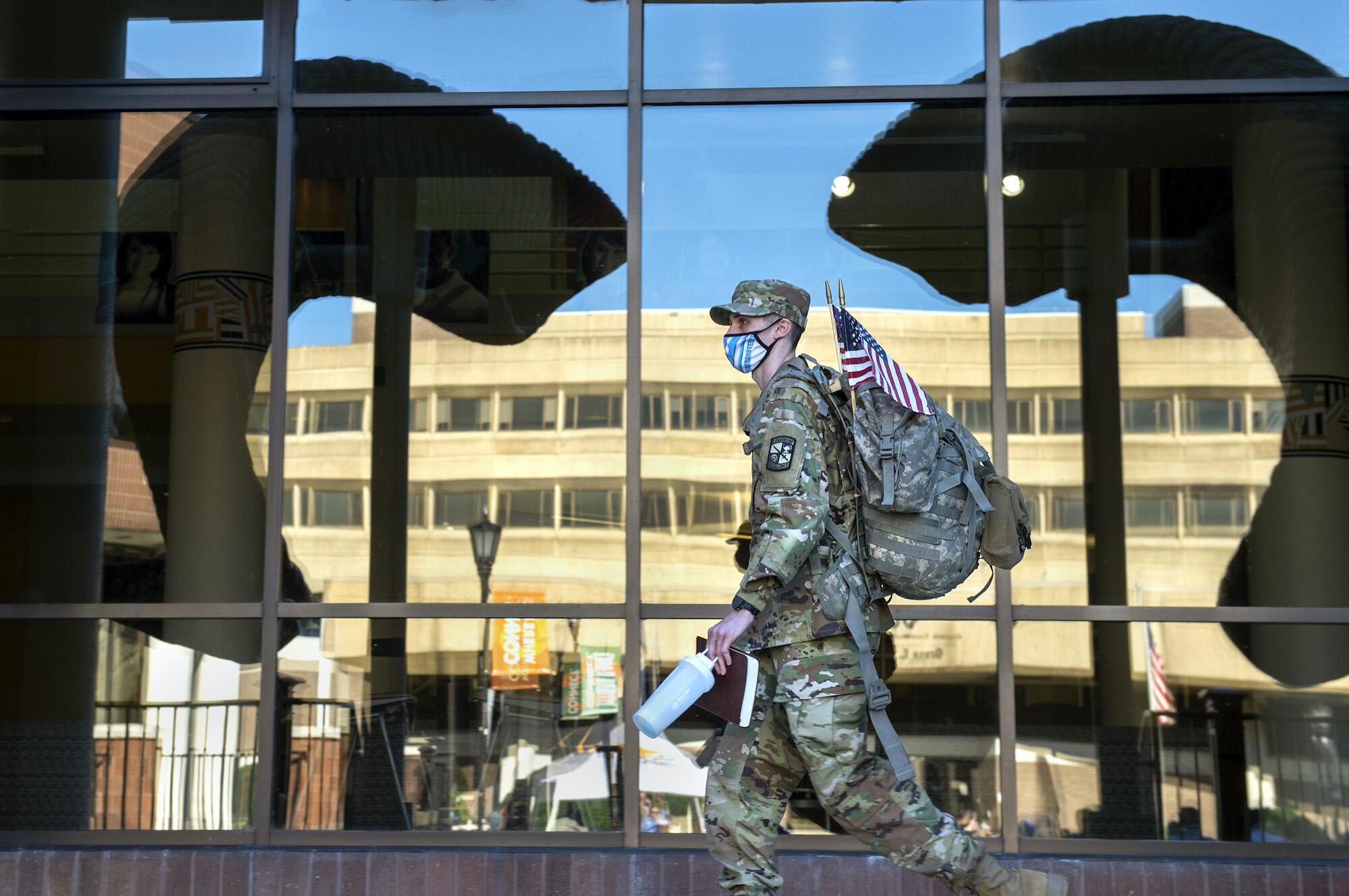
Nov. 10, 2021
Support for military students and their families provides veterans ‘a sense of community’
Share this story
Transitioning from military to civilian life is rarely easy. There are different rules, different manners and even different clothing.
And for those returning from overseas deployment, they can’t easily forget everything they saw during their tour of duty.
Take Jake Davenport. The 27-year-old mechanical engineering major at Virginia Commonwealth University returned from Afghanistan in 2019.
“For a lot of us, we deploy, we spend good amounts of our lives in these countries,” such as Afghanistan or Iraq, he said. “And it’s not a pleasant experience. Most people [join the military] for honorable reasons. They want to help people. I was like that myself. So we go over there, we see how these people are living.
“They don’t have a lot,” he said. For instance, children would come up to soldiers asking for discarded water bottles, which were the only containers they had to carry water from its source back to their homes.
The desire to help others doesn’t go away when soldiers return to civilian life.
“For us, it’s heartbreaking because we spent so much of our time and so much of our lives there and it’s painful watching that happen,” he said. “I can’t just drop [everything] and go back over. I wish I could, but that’s not how that works. So the best way is to do something here.”

A ‘crawl-walk-run’ approach to helping refugees
As part of a growing military student body at VCU, with 250 students who are veterans or military affiliated, Davenport is not alone in his desire to help the refugees now coming from Afghanistan to the United States. He is treasurer and acting vice president of the Student Veterans Association at VCU this semester, and helped spearhead a clothing and supply drive for Afghan evacuees at Fort Lee and Fort Pickett.
Brainstorming with fellow student veterans about the best way to utilize resources for long-lasting effects led to the development of a financial literacy class for refugees.
“We’re taking a crawl-walk-run approach” to the class, Davenport said, starting with what money is, how it differs across countries, how an ATM works, what a credit card is and how credit works.
“It will be developed into a modular class, which will then be translated into multiple different languages,” he said.
In addition to creating opportunities to help refugees, Davenport has been able to get to know other military students while organizing activities and events that build community. The Student Veterans Association hosts social events and physical activities like rock climbing and hiking. Members have had the chance to attend the Student Veterans of America national conference and meet with VCU President Michael Rao, Ph.D.
Building community and ‘a sense of purpose’
Since returning to VCU in the fall of 2020, after a stint here in the early 2010s, Davenport also has received support from and found a home at the university’s Military Student Services office, where he works in marketing.
Military Student Services helps military service members and their families with everything from meeting requirements for the GI Bill to tutoring and career services. It holds group discussions and brings in counselors, and serves as an advocate for military students both in the classroom and with the university’s administration.
Located in Harris Hall, students are welcome to stop by to get assistance, study or simply chat with staff and other students who know what it’s like to adapt to college life after living on military bases, whether at home or abroad, and often experiencing dangerous and high-stress situations.
“Our office tries to help with that adjustment in any way, shape or form that we can, particularly when students haven’t been in the classroom in quite a while,” said Stephen Ross, director of Military Student Services at VCU. “We’re actively engaged in trying to help them adjust to the new environment, whether it be assistance with pointing them in the right direction for housing or academic assistance or anything that they may be struggling with as a new student.
“How do they communicate and correspond with a professor? You know, a lot of veterans tend to be extremely direct. Professors may find that a little intimidating at times or a little uncomfortable. So we try to acclimate, give our students pointers on how to best engage with faculty and staff and with fellow students.”
As a military student and a member of its staff, Davenport has witnessed firsthand the impact Military Student Services can have.
“Military Student Services has been wonderful,” he said. “It’s especially important for a lot of veterans that these people get help. What MSS has really offered is more of a sense of community, a sense of purpose. It really enabled all this to happen.
“They showed me what resources are available at VCU. And they give me a community and a place where I can talk and be around people who are of similar circumstances.”
Subscribe to VCU News
Subscribe to VCU News at newsletter.vcu.edu and receive a selection of stories, videos, photos, news clips and event listings in your inbox.







